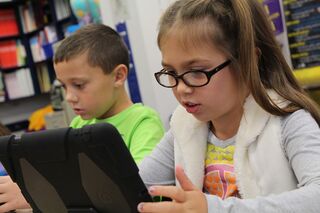Education
Are Teachers Actually "Grading" Parents?
Students' grades may be overly dependent on parental aptitude and involvement.
Posted April 2, 2022 Reviewed by Kaja Perina

When my daughter started middle school, we painfully navigated the transition together. She jumped from one teacher to seven, and that meant different homework turn-in procedures, tools, systems, and technologies.
After figuring out how to log into the online portal, finding the right tool/link, and figuring out where an assignment was listed, we’d see something like “7-E9-P9” assigned and try to figure out which exercise that meant and where it was located. My heart broke for all the kids who didn’t have an adult helping them through the frustrating process.
Not All Homework Is Beneficial
According to Denise Pope, PhD, of Stanford Graduate School of Education, “For elementary-school kids, there is really no correlation between homework and achievement … From middle school on up, we start to see a correlation … [but it] fades after 90 minutes for middle school and two hours for high school” (Passarella, 2015, pp. 150–151). Pope co-founded a nonprofit based on her research at Stanford, which has since published more nuanced guidance (see Challenge Success, 2020). Pope (2015) found the following:
There is no correlation between homework in the elementary years and future success for a kid. In fact, there is not even a correlation for homework in the elementary years and things like teaching the kid responsibility, or teaching them how to … take care of themselves and be responsible for their own things. There’s no correlation between anything with the elementary homework and the future….There is a connection between free reading and doing better academically in future years. (p. 1)
Pope (2015) found the following concerning teenagers:
Researchers found an increase in academic performance when middle school students did up to an hour of homework and high school students did up to two hours daily. But, significantly, these effects began to fade as students did more work …(p. 4)
In addition, students who are overloaded with homework experience exhaustion, loss of time for enriching activities, loss of time for family, sleep deprivation, and stress. A teacher’s assigned homework might land under that recommended limit, but if the teacher is one of multiple teachers a student has then the teacher should account for only a fraction of that shared homework time limit.
Not All Homework Is Equitable
Many experts argue homework is not an inequitable pedagogical practice, since students have drastically different home environments in terms of:
- ability to afford tutors and supplies
- adults’ presence or ability to help
- an environment conducive to concentration, and
- time away from family-supporting jobs (for example, some students are entirely responsible for their younger siblings when they are at home).
An 800-teacher survey in the US revealed that 73% of teachers reported their students’ lack of access to technology or reliable internet was a somewhat (43%) or very serious (40%) obstacle during online instruction, and 87% of teachers reported that limited access to a quiet learning environment was a somewhat (47%) or very (40%) serious obstacle for students (Educators for Excellence, 2021).
Those survey numbers were gathered 9 months into distance learning, after districts had some time to remedy access issues. “Four in 10 teachers claim both technology or reliable internet access and limited access to a conducive learning environment have been ‘very serious’ obstacles for their students. This increases to nearly half of all teachers in schools reporting a majority of low-income students, students of color, or English Learners” (p. 16). By May of 2020, when many parents were working alongside students from home, a mere 6% of teachers reported all (and only 23% most) of their students had adults who could help them with schoolwork (Educators for Excellence, 2020).
Education expert Doug Reeves has written more than 40 books for the education field and earned the Contribution to the Field Award from Learning Forward (formerly the National Staff Development Council). Reeves said (ASCD, 2020), “A commitment to equity means … that success in school doesn't depend upon the conditions of the home—in particular, that a student can achieve academic distinction based on the work they accomplish during the school day” (p. 6).
If student grades are dependent on parents' aptitude and involvement, then they are based on something over which students have no control.
The only type of homework that has been found to regularly benefit all age levels is free-choice reading, with access at school to books that can be taken home, and that option offers more flexibility for students of all home conditions. Each assignment’s potential benefit to a student, as well as its alignment with equity, should be at the forefront of teachers’ minds when assigning work. That way students will get the best homework choices possible.
References
ASCD. (2020, September 1). Grading during the pandemic: A conversation. https://www.ascd.org/el/articles/grading-during-the-pandemic-a-conversation
Challenge Success. (2020). Quality over quantity: Elements of effective homework. https://challengesuccess.org/wp-content/uploads/2021/04/Challenge-Success-Homework-White-Paper-2020.pdf
Educators for Excellence. (2020). Voices from the virtual classroom: A survey of America’s teachers on COVID-19-related education issues. https://e4e.org/sites/default/files/voices_from_the_virtual_classroom_2020.pdf
Educators for Excellence. (2021). Voices from the classroom: A survey of America’s educators. https://e4e.org/sites/default/files/teacher_survey_2021_digital.pdf
Passarella, E. (2015). Do kids really need homework? Real Simple, 11, 150–151.
Pope, D. (2015, June 29). Homework during the elementary school years. Kids in the House. https://www.kidsinthehouse.com/elementary/education/studying-and-homework/homework-during-the-elementary-school-years


